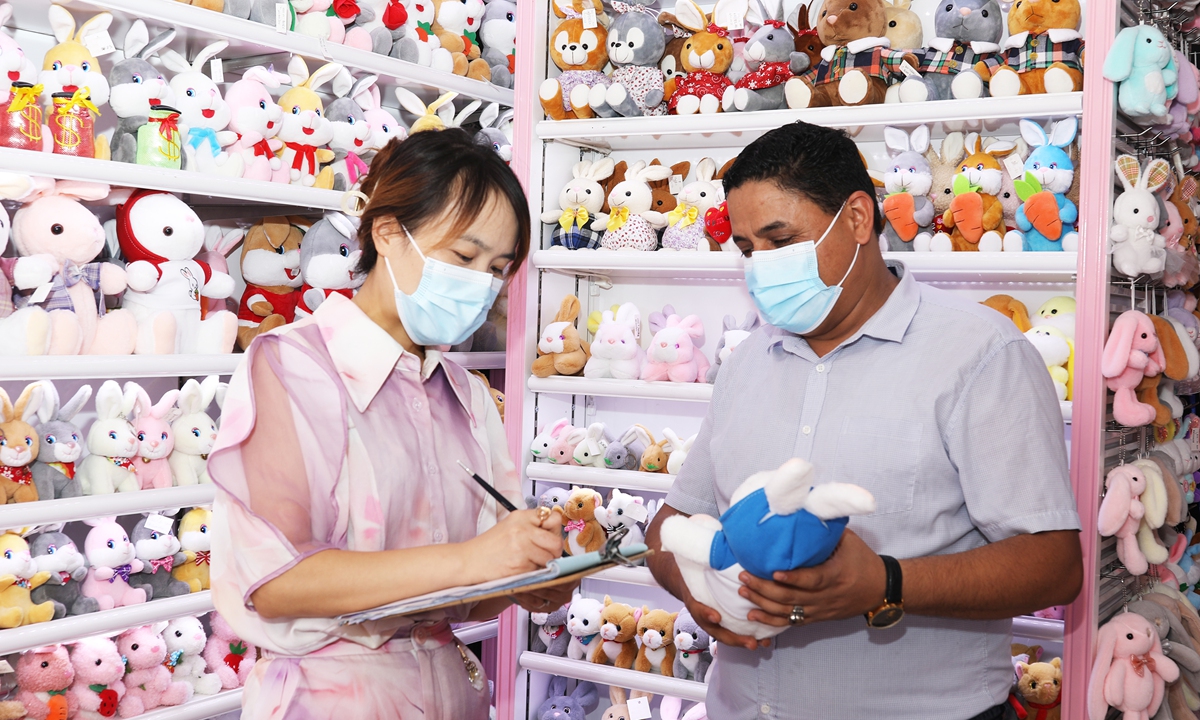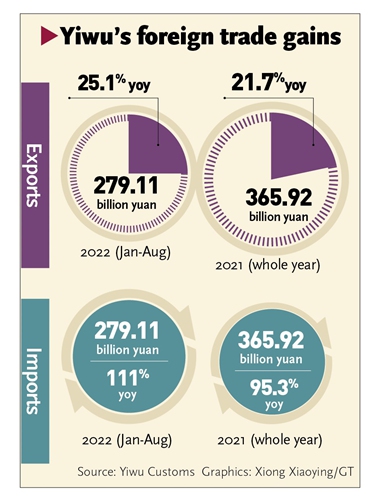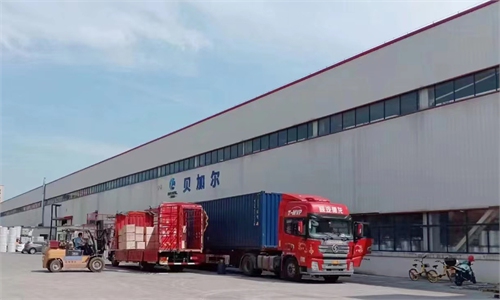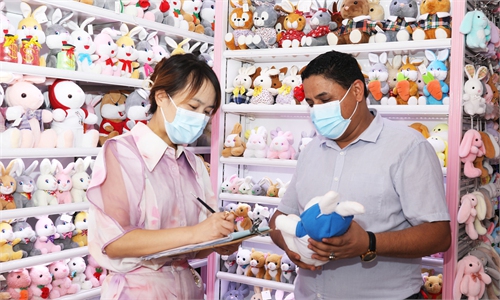Yiwu’s exports gallop prior to 2022 World Cup
China’s resilience in expanding foreign trade to persist: expert

A foreign purchasing agent places orders in a toy shop in Yiwu, East China's Zhejiang Province, on August 25, 2022. Known as the world's small commodity hub, Yiwu has its export peak season in August. Photo: VCG
As the FIFA 2022 World Cup in Qatar approaches, Yiwu, a global small commodity hub in East China's Zhejiang Province, is welcoming the peak season for the shipment of related products, as many manufacturers rush to stockpile raw materials to expand production."The shipment of products related to the World Cup started in May," said a manager surnamed Jin at a Yiwu-based enterprise that makes stickers of national flags, scarves, water glasses and football team capes for export to the Middle East and Europe.
The exports for this year's World Cup are almost as high as for previous events, Jin told the Global Times on Monday, noting that his company has shipped 10 standard containers of World Cup-related products to date and is actively purchasing raw materials to ramp up production.
The Yiwu Sports Goods Association estimated that products made in Yiwu take up to 70 percent of the market share of World Cup accessories, including goods ranging from national flags to horns and whistles, and from footballs, jerseys and scarves, to ornaments and pillows of the World Cup trophy, the Xinhua News Agency reported.
To get the goods faster to fans around the world, Cainiao Network, the logistics arm of e-commerce giant Alibaba, started a special route with shipping partners in Yiwu.
It told the Global Times on Monday that it is providing door-to-door services for the goods produced in Yiwu to the Middle East. The company said it only takes 20-25 days to reach the Qatar Hamad port from the ports of Ningbo, East China's Zhejiang Province, and Shanghai.
Jin said that due to higher raw materials prices, the company's profit may decrease, but his aim is to attract more customers and maintain normal production.
Underscoring the advantages of complete industry chains, Yiwu's imports and exports staged a sound performance between January and August despite sporadic COVID-19 flare-ups across China and increasing competition from Southeast Asia. Its foreign trade hit a milestone of 300 billion yuan ($42.18 billion) to reach 306.6 billion yuan, up 29.8 percent year-on-year, official data showed.

Yiwu also benefited from dividends brought about by the Belt and Road Initiative, the Regional Comprehensive Economic Partnership, the China-Europe Railway Express network as well as the establishment of pilot free trade zones. In August, businessmen from countries including India, Pakistan and South Korea chartered flights to the city for sourcing imports.
As a barometer of China's foreign trade, Yiwu's resilient performance injects confidence into the outlook for the country's imports and exports for the rest of the year.
"Despite mounting external challenges and uncertainties, especially weakening demand from the US and the EU amid a looming recession, China's own comprehensive advantages of complete industry chains, industry aggregation and market size mean the country is able to maintain a sound trade performance in the fourth quarter," Bai Ming, deputy director of the international market research institute at the Chinese Academy of International Trade and Economic Cooperation, told the Global Times on Monday.
The Ministry of Commerce on September 27 introduced a set of new measures to stabilize foreign trade amid weakening external demand.
China will strengthen the ability of foreign trade companies to deliver contracts and further expand their presence in the international market, while efforts will be made to ensure that special funds for international economic cooperation and foreign trade are used fully and quickly, and to enhance services for companies to participate in overseas exhibitions and conduct business negotiations.



